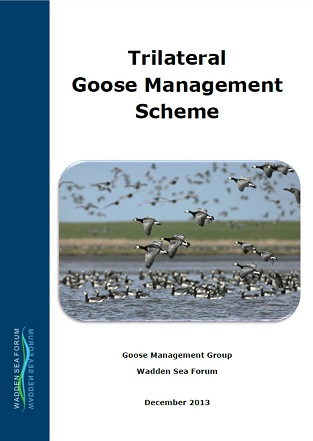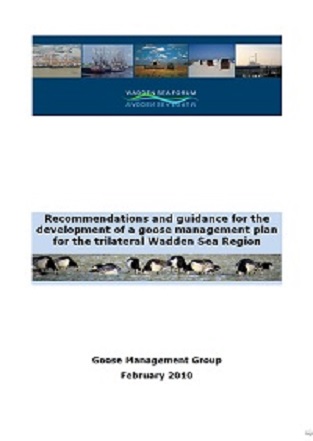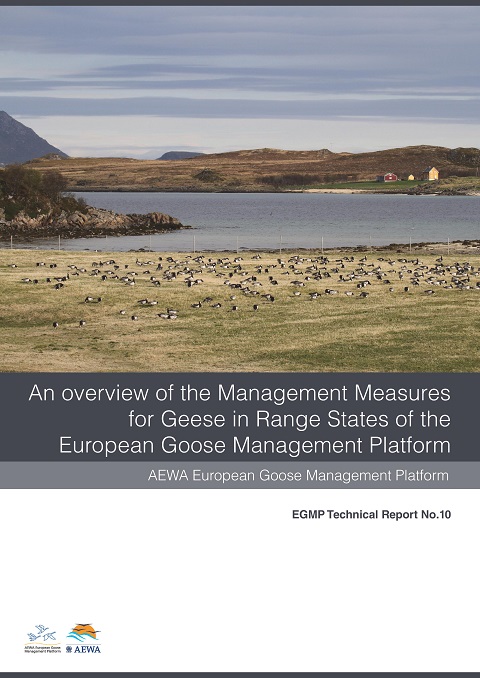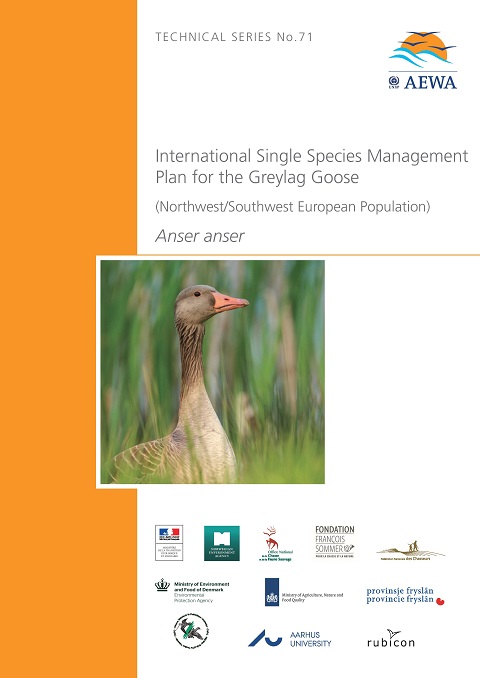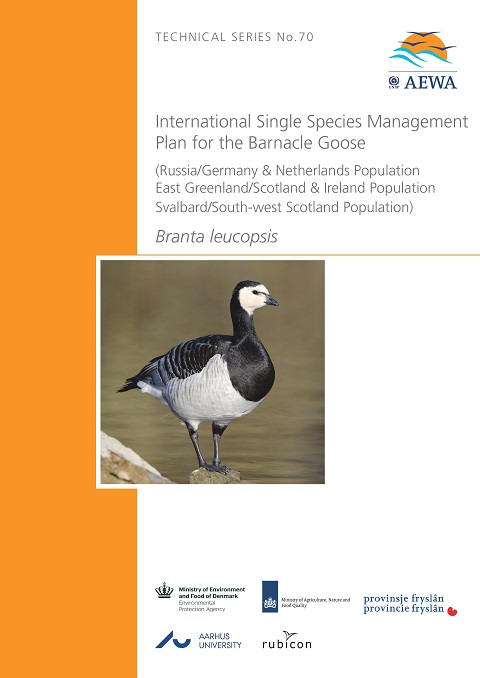Goose Management in the Wadden Sea Region
The proper management of geese is an issue of increasing relevance in the Wadden Sea Region due to increasing numbers of geese and improved cropping systems favored by geese. On the one hand geese are a natural part of the Wadden Sea and adjoining mainland coastal areas and are a typical element of the Wadden Sea Region biodiversity for which the Wadden Sea states have an international responsibility. They also constitute an important touristic attraction. On the other hand, some goose species cause increasing damage to farmlands, while current management schemes for geese are highly variable between countries and liable to further improvement and harmonization.
In 2015 the WSF goose management group decided to cooperate with national and international initiatives to minimize the impacts of increasing migratory goose populations in Europe on economic activities and natural ecosystems.
History
Starting with a trilateral working group on agricultural issues, the WSF specialised on Goose Management and elaborated reports on the topic. Today, the WSF collaborates with AEWA. Find out more about our process of becoming a member of the international regarded and accepted AEWA organisation, our publications and the latest meetings.
At June 19, the EGMP Task Forces met in order to exchange and discuss the progress over the past year. Main part of the Task Force meeting was covered by the workshop on goose population and damages. Members of the Task Force Agriculture presented and published the final report on “Assessment of goose damage to agricultural crops – is there a relationship between goose abundance and yield loss?” https://egmp.aewa.info/sites/default/files/meeting_files/information_documents/AEWA_EGMIWG_Inf_8.15_Goose_Damage_Impact_Assessment.pdf
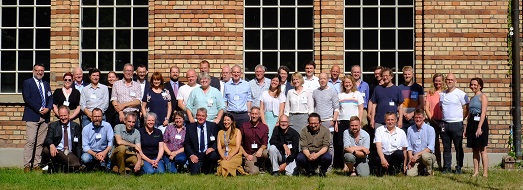 From June 20 to 22 the European Goose Management Platform International Working Group Meeting No. 8 (EGMP IWG 8) took place. The documents and results could be found on https://egmp.aewa.info/meetings/iwg/detail/8th-meeting-aewa-european-goose-management-international-working-group-egm-iwg8. Important step in this meeting was the acknowledgment of the Task Force Agriculture report on the relationship between goose abundance and yield loss. The participants took positive note of the final report. Now the process starts to draw right conclusions and recommendations from the results of the compilation.
From June 20 to 22 the European Goose Management Platform International Working Group Meeting No. 8 (EGMP IWG 8) took place. The documents and results could be found on https://egmp.aewa.info/meetings/iwg/detail/8th-meeting-aewa-european-goose-management-international-working-group-egm-iwg8. Important step in this meeting was the acknowledgment of the Task Force Agriculture report on the relationship between goose abundance and yield loss. The participants took positive note of the final report. Now the process starts to draw right conclusions and recommendations from the results of the compilation.



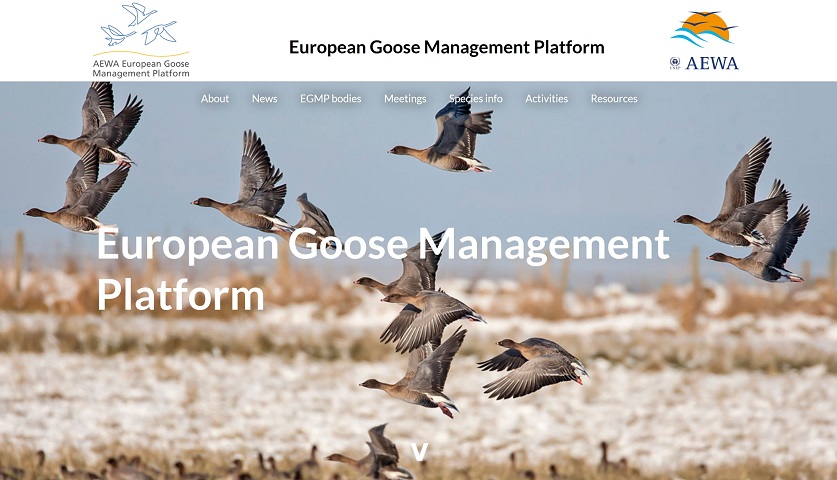
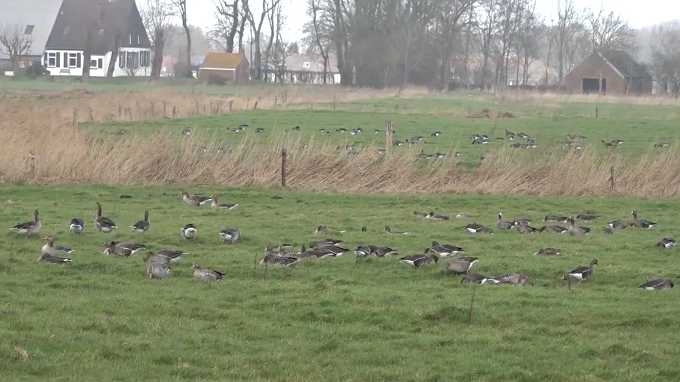
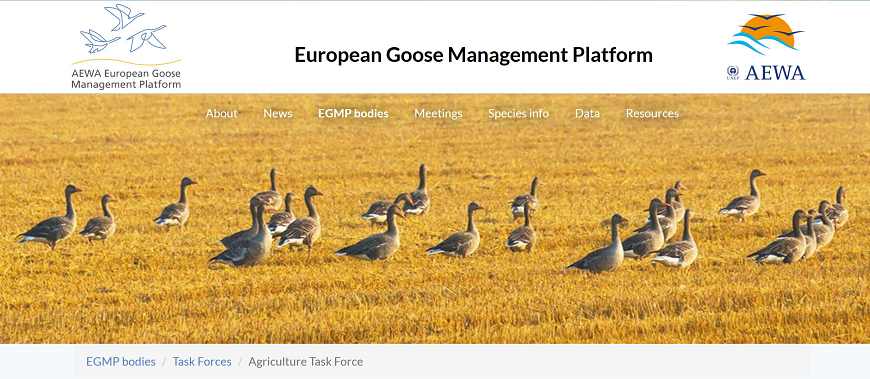
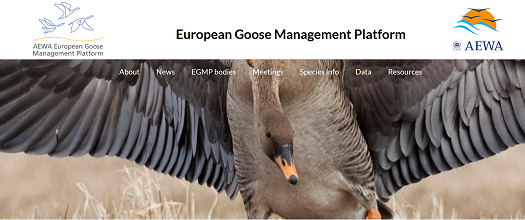
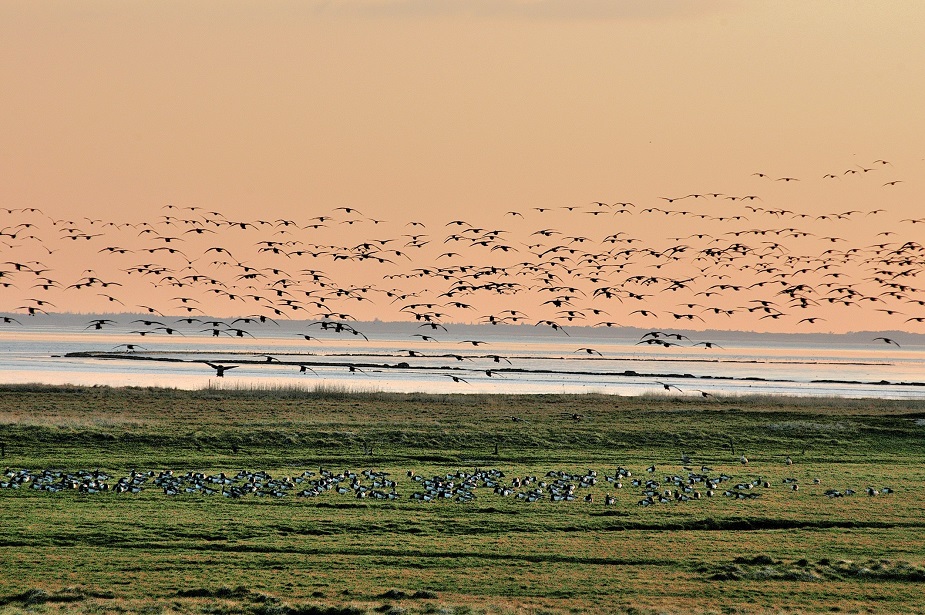 The WSF takes part in AEWA meetings as an observer. This year, the two scheduled meetings (EGM IWG and Taskforce Agriculture) were held as online meetings due to the current situation. Documents from the multi-day online meeting of the EGM IWG can be viewed at
The WSF takes part in AEWA meetings as an observer. This year, the two scheduled meetings (EGM IWG and Taskforce Agriculture) were held as online meetings due to the current situation. Documents from the multi-day online meeting of the EGM IWG can be viewed at 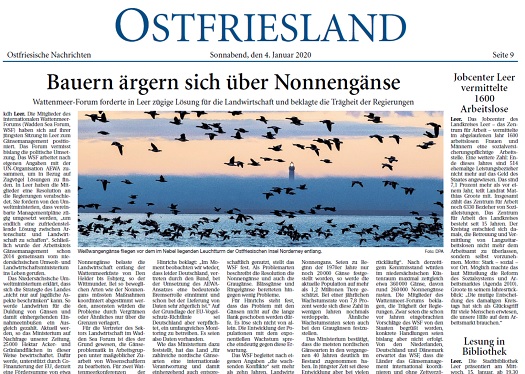 Recently the "Ostfriesische Nachrichten" placed an article about our position regarding Goosemanagement. "Farmers are annoyed about damages caused by barnacle geese. Wadden Sea Forum calls for a quick solution for agriculture in Leer and complains about the inactivity of the regions." (
Recently the "Ostfriesische Nachrichten" placed an article about our position regarding Goosemanagement. "Farmers are annoyed about damages caused by barnacle geese. Wadden Sea Forum calls for a quick solution for agriculture in Leer and complains about the inactivity of the regions." (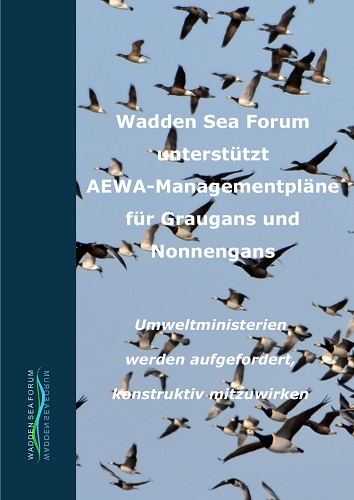 The WSF plenary discussed in its meeting on 18-19 November the process of implementing the AEWA management plans for Greylag and Barnacle geese on flyway level. These management plans were adopted by the range states in December 2018. For the implementation in the different countries Favorable Reference Values (FRVs) have to be defined. As this process is lacking, the WSF elaborated a resolution, which requests the responsible ministries to speed up the process and support the AEWA concept. The Meeting adopted the
The WSF plenary discussed in its meeting on 18-19 November the process of implementing the AEWA management plans for Greylag and Barnacle geese on flyway level. These management plans were adopted by the range states in December 2018. For the implementation in the different countries Favorable Reference Values (FRVs) have to be defined. As this process is lacking, the WSF elaborated a resolution, which requests the responsible ministries to speed up the process and support the AEWA concept. The Meeting adopted the 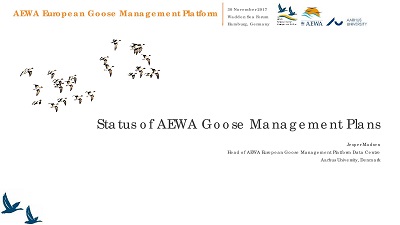 Presentation on 30 November 2017 at AEWA European Goose Management Platform:
Presentation on 30 November 2017 at AEWA European Goose Management Platform: 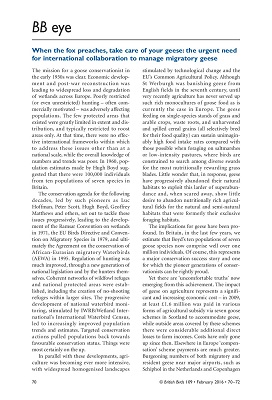 "When the fox preaches, take care of your geese: the urgent need for international collaboration to manage migratory geese"
"When the fox preaches, take care of your geese: the urgent need for international collaboration to manage migratory geese"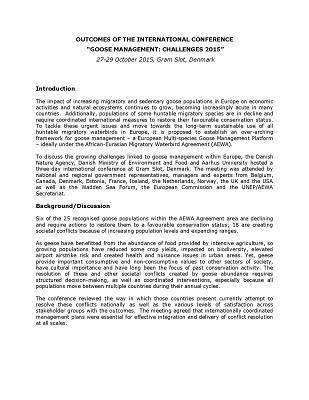 GOOSE MANAGEMENT: CHALLENGES 2015
GOOSE MANAGEMENT: CHALLENGES 2015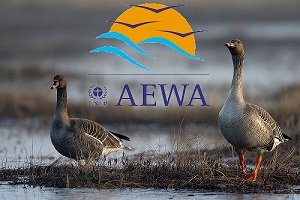 In 2015 the WSF goose management group worked on concrete steps to implement the trilateral goose management scheme. The installation of a management group under the responsibilities of the regional governments (province or state level) failed due to low commitment. Further management tasks are beyond the power and responsibility of the WSF and following, it was decided to suspend the regular meetings of the goose working group. Nevertheless, the WSF is going to cooperate with national and international initiatives to minimize the impacts of increasing migratory goose populations in Europe on economic activities and natural ecosystems.
In 2015 the WSF goose management group worked on concrete steps to implement the trilateral goose management scheme. The installation of a management group under the responsibilities of the regional governments (province or state level) failed due to low commitment. Further management tasks are beyond the power and responsibility of the WSF and following, it was decided to suspend the regular meetings of the goose working group. Nevertheless, the WSF is going to cooperate with national and international initiatives to minimize the impacts of increasing migratory goose populations in Europe on economic activities and natural ecosystems.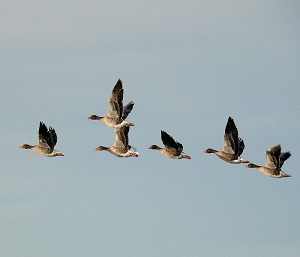 The proper management of geese is an issue of increasing relevance in the Wadden Sea Region due to increasing numbers of geese and improved cropping systems favored by geese. On the one hand geese are a natural part of the Wadden Sea and adjoining mainland coastal areas and are a typical element of the Wadden Sea Region biodiversity for which the Wadden Sea states have an international responsibility. They also constitute an important touristic attraction. On the other hand, some goose species cause increasing damage to farmlands, while current management schemes for geese are highly variable between countries and liable to further improvement and harmonization.
The proper management of geese is an issue of increasing relevance in the Wadden Sea Region due to increasing numbers of geese and improved cropping systems favored by geese. On the one hand geese are a natural part of the Wadden Sea and adjoining mainland coastal areas and are a typical element of the Wadden Sea Region biodiversity for which the Wadden Sea states have an international responsibility. They also constitute an important touristic attraction. On the other hand, some goose species cause increasing damage to farmlands, while current management schemes for geese are highly variable between countries and liable to further improvement and harmonization.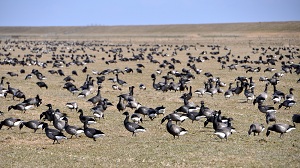 A Goose Management Group set up under the Wadden Sea Forum (WSF) with the participation of representatives of national and regional authorities and relevant stakeholders elaborated a report on Goose Management for the Wadden Sea Region, delivered to the 11th Wadden Sea Conference (TGC) in 2010.
A Goose Management Group set up under the Wadden Sea Forum (WSF) with the participation of representatives of national and regional authorities and relevant stakeholders elaborated a report on Goose Management for the Wadden Sea Region, delivered to the 11th Wadden Sea Conference (TGC) in 2010. 